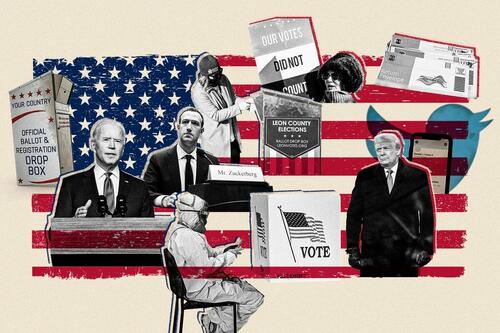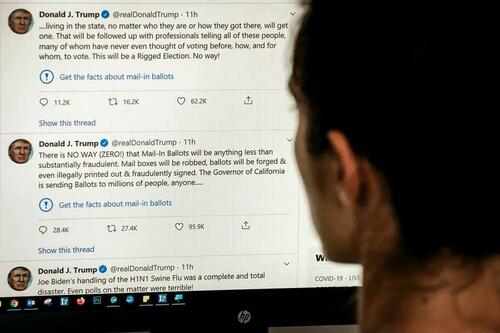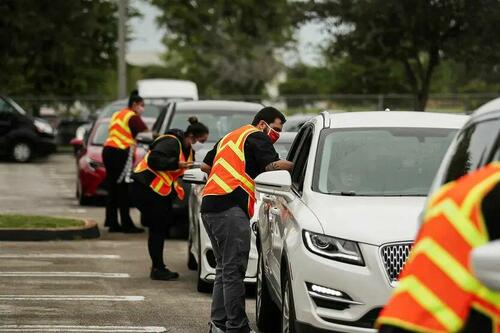A ‘Well-Funded Cabal’ Influenced The 2020 Election—What Lies Ahead In 2024?
Authored by Kevin Stocklin via The Epoch Times (emphasis ours),

News Analysis
While former President Donald Trump appears to be cruising toward the GOP nomination, and with a polling lead over incumbent President Joe Biden in key swing states, Republicans will likely face a much steeper climb in the general election than they realize.
Fundamental changes in state election laws, coupled with an alliance of left-wing federal, corporate, financial, and nonprofit entities, have handed the Democratic Party advantages that the GOP may be unable to overcome.
In the decades before 2020, the Republican National Committee (RNC) and Democratic National Committee (DNC) machines each had their own unique strengths: The RNC had the money and the DNC had the troops.
As noted in the book “The Victory Lab,” an analysis by political journalist Sasha Issenberg, Republicans excelled at fundraising and spent heavily on messaging through paid television, radio, and online ads. The DNC, with its voters often concentrated in urban centers, called on its foot soldiers, most notably students and union leaders, to go door-to-door and stir up support.
In 2020, the landscape shifted in the wake of two events: The COVID-19 pandemic and the death of George Floyd in police custody. A narrative emerged that existing state voting laws were hazardous to public health and racist and that they had to change.
The 2020 ‘Shadow Campaign’
In a laudatory 2021 article in Time titled “The Secret History of the Shadow Campaign That Saved the 2020 Election,” author Molly Ball detailed a “well-funded cabal of powerful people, ranging across industries and ideologies, working together behind the scenes to influence perceptions, change rules and laws, steer media coverage, and control the flow of information.”
While praising the effort, Ms. Ball said that the actors “were not rigging the election; they were fortifying it.”
The “conspiracy,” as Ms. Ball described it, included DNC operatives, union leaders, tech and social-media companies, Wall Street bankers, and a network of nonprofit donor funds that pooled hundreds of millions of dollars to finance “armies of poll workers and got millions of people to vote by mail for the first time.”
While the coalition’s purpose, ostensibly, was “saving democracy,” the overriding goal was to keep President Trump from winning a second term.
And the “well-funded cabal” appears to be gearing up for a repeat performance in 2024, with a few new twists.
The DNC and groups allied with them rely on a five-part strategy to ensure that President Trump didn’t then and will not now get a second term.
That strategy includes intense legal pressure on state election officials to loosen voter integrity laws, a data nerve center that contains personal profiles of voters to predict how they will vote, an alliance of left-wing foot soldiers to bring out Democratic votes in key swing states, a collection of groups capable of bringing violence and mass unrest to cities and towns if called upon, and a network of financing vehicles to fund it all.
The first order of business, once the “well-funded cabal” was assembled, was to change state election laws.
Rewriting Election Rules
Following the mantra to “never let a crisis go to waste,” a nationwide campaign of DNC-sponsored lawsuits forced many states, even some with Republican governors, to drop what had once been standard voter integrity practices.
“That effort involved voiding basic security protocols on election procedures, including absentee ballots, and pushing for the equivalent of all-mail elections, which would give their activists a free hand in pressuring, coercing, and influencing voters in their homes in ways they are unable to do in polling places,” political analysts John Fund and Hans von Spakovsky wrote in their 2021 book titled “Our Broken Elections.”
“To force these changes, they ended up filing more election-related lawsuits than had ever been filed in an election year in U.S. history,” the authors said.
Perhaps the most enticing of all the electoral opportunities presented by the pandemic and civil unrest was the advent of universal, unsolicited mail-in ballots, which are still in use in some states.
According to the U.S. Census Bureau, 43 percent of American voters cast their ballot by mail in 2020, compared to 21 percent who did so in 2016.
In their book, Mr. Fund and Mr. von Spakovsky wrote that “the flood of millions of mail-in ballots opened the system to unprecedented confusion and largely untraceable fraud.”
“There’s a reason that a bipartisan commission co-chaired by former President Jimmy Carter in 2005 called mail-in absentee ballots the ‘largest source of potential voter fraud’ and that most countries in the European Union have banned ‘postal voting’ over the same concerns,” they wrote.
The topic of election fraud has become sharply politicized, with conservatives insisting that it’s a significant enough problem to sway the outcome of elections, and left-wing groups insisting it isn’t.
The Heritage Foundation, a conservative think-tank, keeps an ongoing database of cases of voter fraud, documenting 1,500 cases to date and 1,276 criminal convictions. The group stated that illegal voting has resulted in election results being overturned in at least a dozen races.
However, the left-leaning Brookings Institution stated that what’s recorded in the Heritage database “may sound like big numbers, however … the findings encompass more than a decade of data during which, nationally, hundreds of millions of votes have been cast.”
In December 2023, Rasmussen Reports and The Heartland Institute conducted a survey of more than 1,000 voters regarding how they cast ballots in 2020; responses were evenly split between Republican and Democratic voters, and 30 percent of respondents said they voted by mail.
Of the respondents who voted by mail, 21 percent said they had done so in a way that, whether they were aware of it or not, violated election laws. This includes filling out ballots for friends and relatives and forging other people’s signatures on ballots.
“We asked if they voted by mail in a state in which they are no longer a permanent resident, which is voter fraud,” Justin Haskins, a director at the Heartland Institute, told The Epoch Times. “About one in five respondents who voted by mail in the 2020 election said yes.”
The survey also found that 8 percent of respondents said a friend, family member, or organization offered to pay or reward them for voting in the 2020 election.
The Privatization of State Voting Systems
The “voter suppression” narrative, which gained acceptance throughout many parts of America, played to the strengths of the Democratic Party.
“Because the tax code allowed nonprofit organizations to run registration and turnout drives as long as they did not push a particular candidate,” Mr. Issenberg wrote, “organizing ‘historically disenfranchised’ communities became a backdoor approach to ginning up Democratic votes outside the campaign finance laws.”
One example of what Mr. Fund and Mr. von Spakovsky call the “privatization” of state election systems by wealthy donors, is the Chicago-based Center for Tech and Civic Life (CTCL), a group that is nominally nonpartisan but led by Democrat activists.
CTCL received $350 million from Facebook founder Mark Zuckerberg’s Chan Zuckerberg Initiative, ostensibly to protect the health of voters and election officials during the pandemic.
These “Zuckerbucks,” as they have come to be known, were channeled through CTCL into 2,500 mostly liberal jurisdictions to pay for new polling locations, ballot drop boxes, “voter education” centers, and campaigns to reach non-English-speaking voters, according to the authors.
In one instance, CTCL gave $10 million to the city of Philadelphia, whose entire election administration budget was $15 million before the grant. However, CTCL stipulated that the funds be used for “private printing and postage for mail-in ballots and to scatter ballot drop boxes,” the authors wrote.
Read more here…
Tyler Durden
Thu, 02/01/2024 – 16:20
via ZeroHedge News https://ift.tt/Xs3A0fD Tyler Durden

